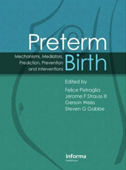Preterm delivery is probably the most important problem in obstetrics, and a major public health concern. Recent
developments - such as the preventive use of progesterone, and new data on possible mechanisms of initiation of
parturition ?have placed the topic at the forefront of the interests and preoccupation of many in maternal-fetal
medicine and obstetrics.
Recent studies have found that preterm deliveries have increased even amongst low risk women. Also shown is that
assisted conceptions, multiple pregnancies and elective deliveries are associated with early birth. The impact on
society is considerable. Preterm birth can also have considerable impact on long-term health, including severe mental
or physical disability. With all this being currently debated, Obstetricians should re-evaluate the risks and benefits
of delivering babies earlier.
This book, published in collaboration with the Society for Gynecologic Investigation, is a balanced, authoritative,
well-referenced work with a rigorous underpinning of basic science and evidence-based clinical guidelines. The Editors
have ensured that there is development of modern ideas throughout regarding understanding, research, prevention and
treatment of preterm birth.
The book will be essential reading for Specialists in Maternal-Fetal Medicine, Obstetrics and Perinatology. Since the
book also highlights definitions, classifications and management algorithms, it will also be useful to general ObGyns,
both in practice and training.
Table of Contents
1. The feto뻜etal transfusion syndrome story, an historical perspective. 2. The epidemiology of twin뻯win transfusion
syndrome. 3. Pathophysiology. 4. Evidence on physiopathology. 5. Placental pathology and twin뻯win transfusion
syndrome. 6. Mathematical modeling of twin뻯win transfusion syndrome. 7. Ultrasound assessment in twin뻯win
transfusion syndrome. 8. Amnioreduction therapy for twin뻯win transfusion syndrome. 9. Laser treatment for twin뻯win
transfusion syndrome. 10. Umbilical cord occlusion in twin뻯win transfusion syndrome. 11. Treatment of twin뻯win
transfusion syndrome: an evidence-based analysis. 12. The role of Doppler assessment in twin뻯win transfusion
syndrome. 13. Outcomes and complications of the surgical treatment of twin뻯win transfusion syndrome. 14.
Echocardiography in twin뻯win transfusion. 15. Organization of nursing responsibilities. 16. Ethical challenges in
the management of twin뻯win transfusion syndrome. 17. Neurological outcomes after therapeutic interventions for twin?
twin transfusion syndrome. 18. Anesthesia for surgical treatment of twin뻯win transfusion syndrome.


